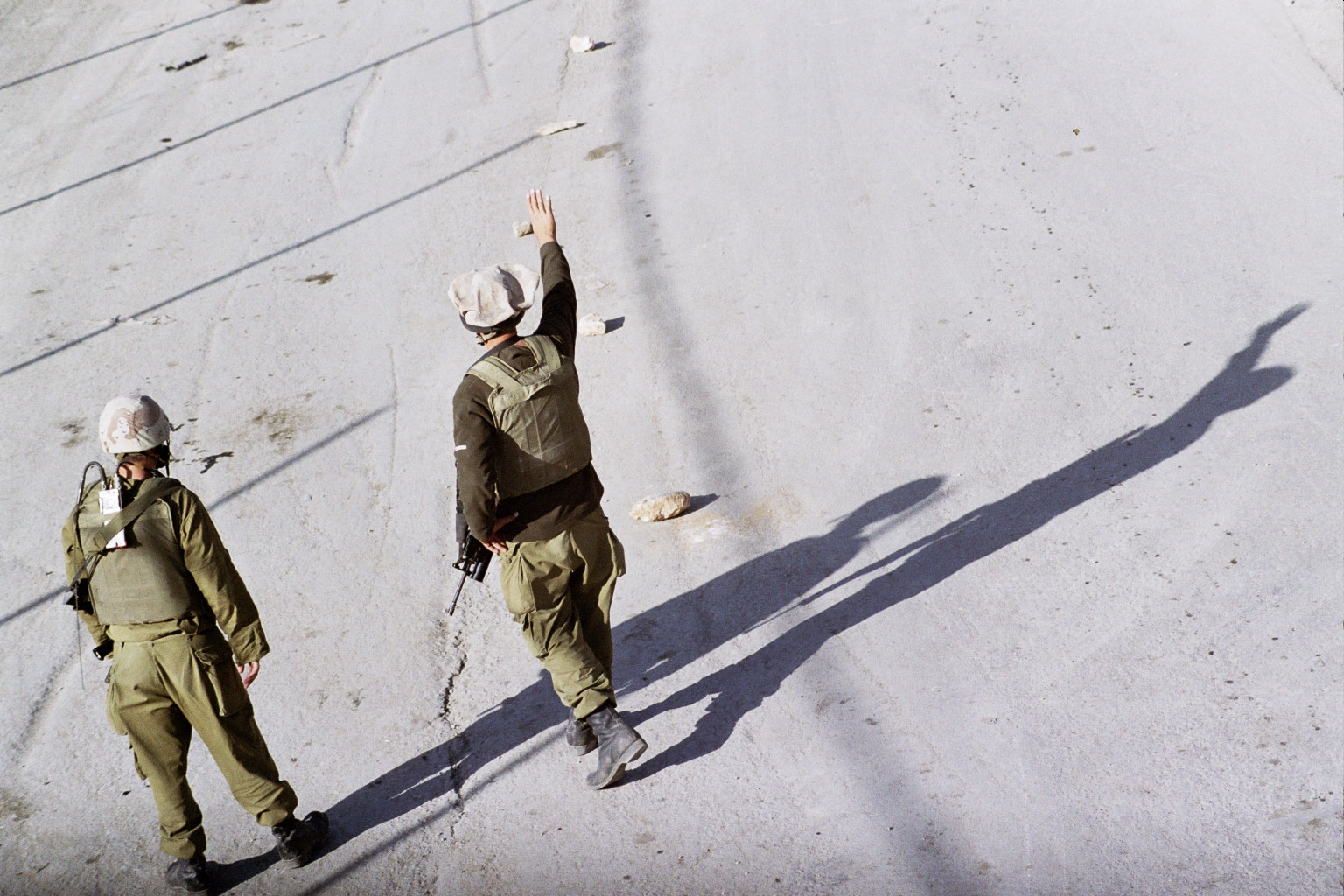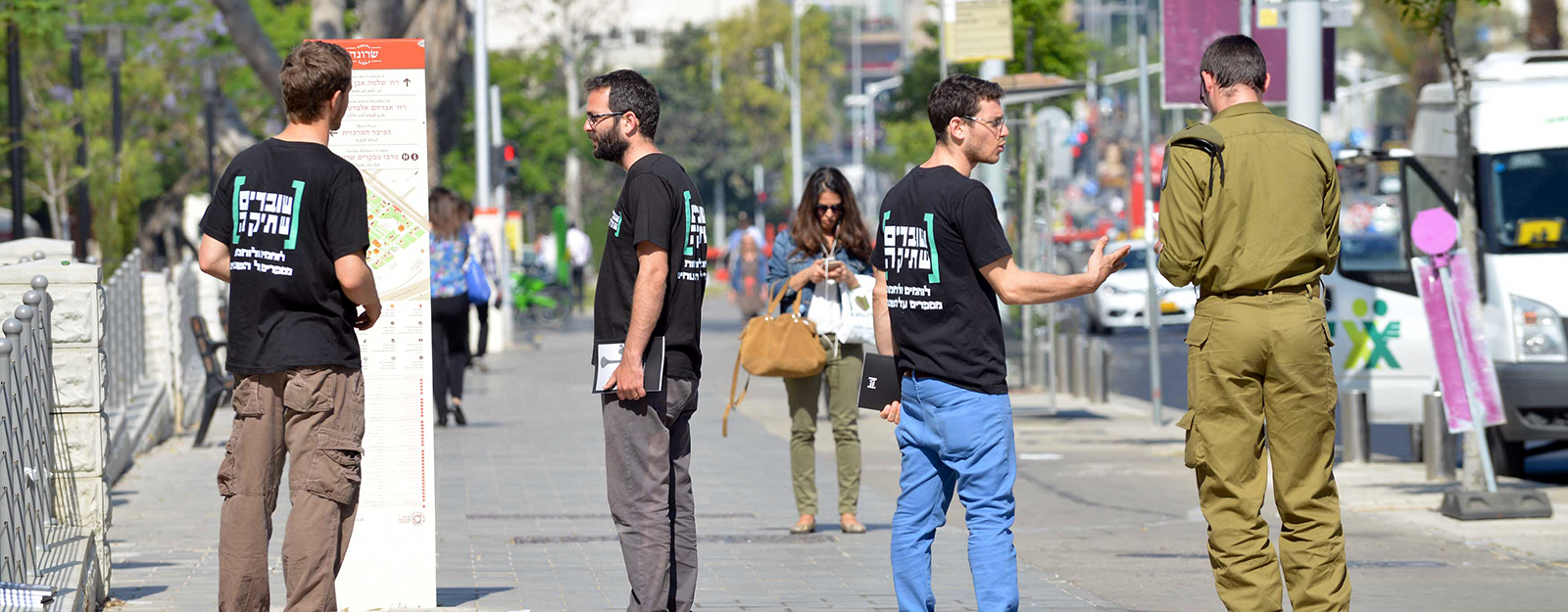How old were they? I don’t know, 13-14 up to 40-50, something like that. We were told, “If you get it wrong in one direction or the other [of the age scale], that’s okay.”
So it was more or less? Yes. What can you do? Again, without getting into politics, there’s nothing you can do about it. We put them in those pens. In retrospect, we didn’t know that the terrorist who had carried out the attack was in one of our pens. Two-three weeks later, we caught him.
So in the end, that whole pen thing wasn’t so effective. The pens were put up by the Shabak (Israel Security Agency). We were told to get the men in there and then the Shabak went over them one by one, and they brought their ID cards so we could check every one of them, make sure it’s them. In the end, it was the Shabak’s failure. I remember that we even let out everyone who wanted to pray so they could go to the mosque, and they came back afterwards. Just like that.
After you were done? No, we held on to their ID cards and they went out, prayed at the mosque, and came back to the pen. That was it.
How long did you say it took until you were through? It happened in the morning and, once it started getting dark in the evening, we let everyone go home and we stayed on there. Our battalion stayed for two days and our company stayed for a week. A week. We flew Israeli flags over our fort… an outpost.
The pen turned into a fort? No. We took over a huge house with a family in it. It was the home of a very rich family. They were actually a family from Ramallah, the owners, and the whole house upstairs was some general in the Moroccan army. Listen, it was a very wealthy household. The father came over to talk to us, so we wouldn’t ruin the house. He said, “Stay here, but please, don’t ruin my home”.
Did you tell them to get out or did you concentrate them [in one spot]? At first, they were on the first floor, and then we started questioning them, “Where are you from?” Then we let them go, there wasn’t any danger that we’d be discovered, the whole village saw us patrolling all around there, and there were three armored vehicles and two army jeeps in the parking bay of that house, really like… You know, it ends up being unpleasant, having a family on the first floor. We just happened to find a really good place.
You’re saying you hung flags on that house too? Yes, on that house.
The Israeli flag or the Shimshon battalion flag? Israeli, Israeli. Again, so that in Bat Ayin, they’d know that there was military presence in the village.
Who said that? Is that your interpretation or did officers come and say, “Listen, the flag is for the guys in Bat Ayin”? I think it was said. I can’t be sure, because I don’t really remember whether it was actually said outright or if that was just the spirit of things. But it was clear that, I mean, you raise a flag over a house, but it’s also for the soldiers’ morale. It’s very important that the soldiers…
And the guys on patrol just wander around? A patrol would be sent out, some eight soldiers, to check that there was no one on the streets. Because, after all, we were the only company in the village. A village and a half, it was divided…
And you’d also do check posts and stuff? Of course, yeah, it’s another way to break up the routine. In the end, you can’t work out what your mission is. You’re doing inspections and check posts and lookout shifts and…
Was the village under some kind of curfew? There were two days of curfew, but again, not the kind where no one can leave the house. We blocked off their village in such a way that no one could enter or leave without going through our inspections. I mean, it’s not that they couldn’t go in or out. They had to be inspected.
And this lasted only two days, and then you reopened the entrances and exits? Two days, two days and then we opened up the way in and out of the village, but we kept them separated from Beit Ummar. I mean, there were fences…
Cutting the village off from Beit Ummar. Yes.
Which you did how? There’s a road. Here’s Beit Ummar and there’s Khirbet Safa. There’s a force there whose job it is to check whatever’s going on. Everyone going in and coming out got inspected.









 testimonies
testimonies  media & content
media & content 










 We took over a huge house with a family in it. It was the home of a very rich family
We took over a huge house with a family in it. It was the home of a very rich family 

 terms of use & privacy policy
terms of use & privacy policy